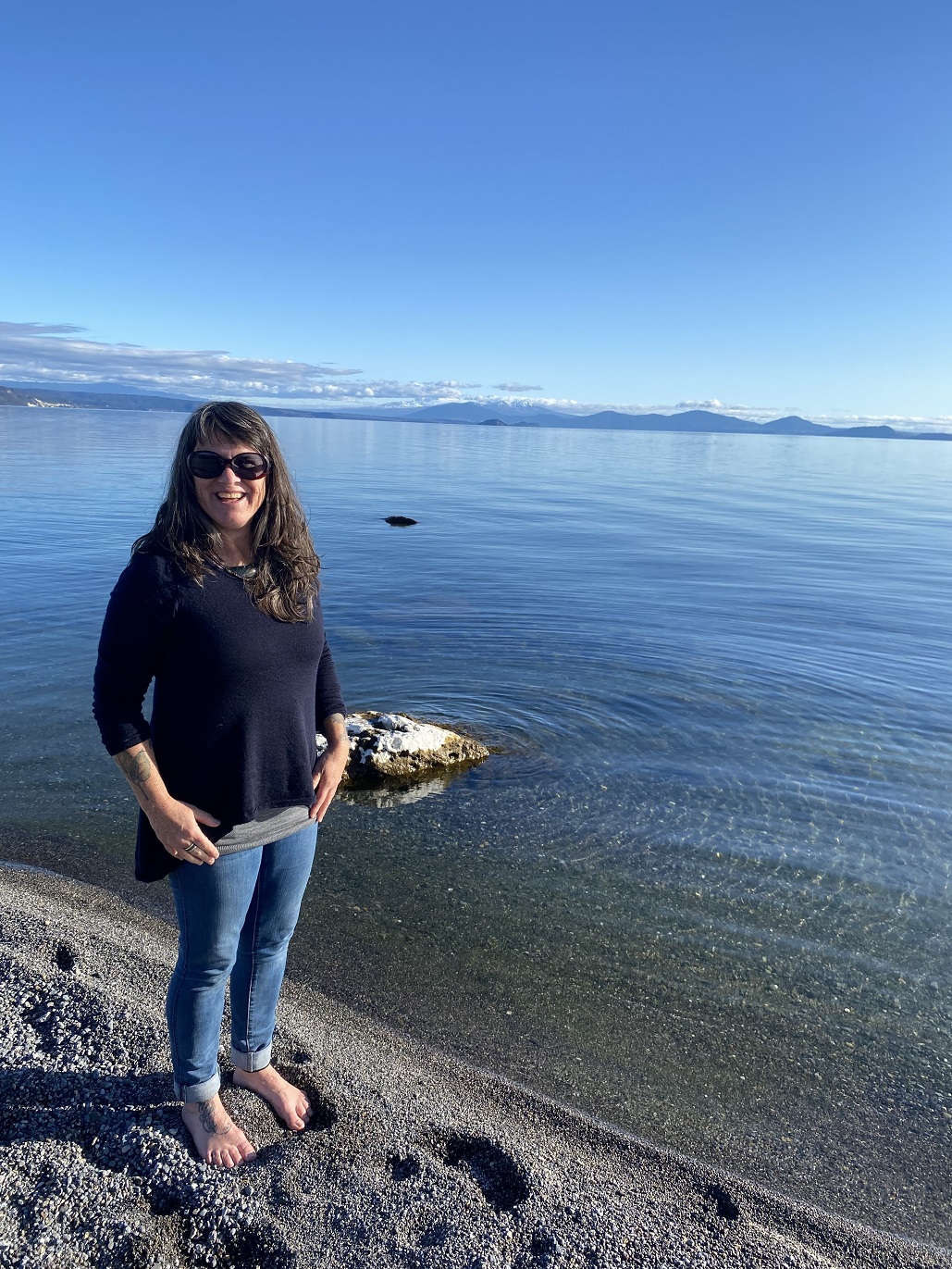
It has become "screamingly obvious" to writer and editor Iona Winter there has been no place for multiple expressions of grief in New Zealand, so she has set about rectifying it.
Never one to shy away from talking about difficult things, Winter has just released a liminal gathering, which brings together words, sounds and images of grief from 103 New Zealand contributors, aged from 13 to 83.
"It feels like I’ve done what I’ve set out to do — to be unafraid of saying we need a space for grief, it felt really important to me."
While the past few years have been tough on Winter as she lives with the grief of losing her son Reuben to suicide, she has found pulling together the almanac to be "very beautiful for the most part".
"Doing this has affirmed to me how important it is to speak, to find our voice, whether it’s through words, images or music — how important art is when we are grieving."
Its release is also very bittersweet, given it would not have been written if she had not lost her son.
"My writing has saved me from falling under with this grief. If I hadn’t been able to write, I don’t feel like I would have been living much of a life. It has helped to rant away on the page — some of that stuff will never see the light of day, but just to express it. Art is very powerful."
Part of the book’s progress came about because she finished her non-fiction book on being suicide bereaved, Counter of Moons, which will be published next year, and moved to Tasman.
"I don’t think I could have pulled together this almanac if I was in Dunedin. I needed to be somewhere where no-one knew me for a good six months to get it done. I’ve been able to hermit away."
Winter, who whakapapas to Moeraki and Karitane and grew up in West Auckland, heeded the call to return home, spending 10 years in Dunedin before moving north. For part of that time in Dunedin she was poetry editor of The Mix in the Otago Daily Times.
"All my Scottish ancestry, my Irish ancestry and my Māori ancestry all converged in Otepoti Dunedin, so I had to be there."
She moved away mainly for health reasons, but she also found there were too many reminders of her son to remain in the city.
"He was such a prolific musician, he knew people everywhere."
She now shares space in Motueka with her mum, who is in her late 70s .
"It’s all worked out."
The idea for the almanac came from a feeling Winter had of her son "tapping her on the shoulder one morning" and suggesting she should do something for other people in their grief.
Having written about living with suicide bereavement, she was aware there was no shared creative outlet for people experiencing grief.
"As soon as I made that decision it all started to flow and the name came through, Elixir being one of Reuben’s totem albums and ‘star’ being his first word. It all just kind of came together when I was clear about it."
It became important it was a multimedia collection and not just a collection of "New Zealand’s most famous".
"Everyone experiences grief, it’s a natural part of being human."
So she put out a call for submissions and attempted to get Creative New Zealand funding — but not being successful, she started a Boosted campaign instead.

She got many more submissions than she could use, about 250, with people often commenting they did not mind if she used it or not, but loved what she was doing.
"There were some very moving pieces and also some very matter-of-fact pieces."
Having to say no to so many has been the biggest challenge of the project, she says.
“Work that ‘got me’ was included and the range of grief expressed couldn’t be broader."
Receiving a submission from a 13 year old stood out for Winter.
"We need to empower our young people coming through to talk about it and be OK talking about it."
Some writers used pseudonyms, as for some the topics are deeply personal, and some are recently bereaved or have very public jobs.
"It does feel like I’ve had to tread carefully and mindfully. However, [I’m] not wanting to make something that requires content warnings — this is real life, it is what we all go through, some more than others."
The support has been given quietly, not shouted about on social media unlike many other projects, she says.
"We’ve got so much stigma around grief. We don’t talk about it, it’s tucked away under the carpet and there are so many expectations, including from health professionals, that we should be over something in an allotted time."
Winter found, especially after working in the mental health field for 25 years and "walking alongside my boy in his grief process", as he had lost a best friend to suicide, that it was not that simple.
"Knowing in myself with people who have died around me or big losses, in terms of identity and work, so just knowing everyone does it differently."
She has felt grief and grieving has been very pathologised for many years.
"You can’t know it, unless you have done it."
As a result she wanted the almanac to be a good representation of different people and situations — from the loss of parents, siblings, pets, partners and of facing impending death, to loss of identity and grief for nature.
"I think I have achieved this. All sorts of topics people experience grief around. How people choose to show that."
Two of her musician son’s friends have curated a playlist to be listened to alongside the almanac, although she has not yet been able to listen to it herself.
"I’ve struggled with music since he’s died, I find it triggering. There is no one size fits all."
She chose the almanac format as she did not want it to be an online book.
"Its a taonga, a treasure. It’s something to be shared. If someone had given me something like this when my boy died it probably would have been quite helpful.
"To be able to sit quietly with a book and listen to some music. It just felt really important. While we can’t all find the words or make images to express our grief, this pukapuka [book] seeks to provide some comfort and acknowledgement to those who are bereft,” Winter says.

Winter, as a poet and writer, found the visual art submitted, such as photography, paintings and craft, particularly special.
"The images are great for me. I think they anchor the text too, give it a breather between words."
Putting the almanac together under her own publishing company, Elixir & Star Press, had been a seven-day a week job for her until she released it earlier this month. Winter has taken on all roles for the first almanac, from collating and typesetting to public relations and marketing.
"It’s taken a lot of energy, next time round I’ll apply earlier for more funding so I can pay people. I’ve learnt a lot."
She feels excited about the almanac being seen by the public, having released it in Auckland and Dunedin, and is hopeful libraries will also pick it up so it is accessible to all.
"It felt important as there are people from throughout Aotearoa — every area in New Zealand has been covered by somebody."
While some have questioned her releasing the almanac so close to Christmas, she has challenged that thinking, as for many grief can hit hard during those special times.
"People really feel it at Christmas or around birthdays or around any other sacred days."
With Counter of Moons and a book of poetry due out next year, Winter hopes to embark on a new poetry project next year.
Any profits from sales of a liminal gathering will be reinvested for the next Elixir & Star Grief Almanac in 2025.
"It has rounded off the first three years after Reuben’s death. It feels like a potent and powerful thing to have been done. It illustrates we all grieve and differently."
THE BOOK:
a liminal gathering, by Iona Winter.
Where to get help in NZ
Healthline: 0800 611-116
Lifeline Aotearoa: 0800 543-354 or text 4357
Suicide Crisis Helpline: 0508 82-88-65 (0508 TAUTOKO)
Samaritans: 0800 72-66-66
Alcohol Drug Helpline: 0800 787-797
General mental health inquiries: 0800 44-33-66
The Depression Helpline: 0800 111 757












